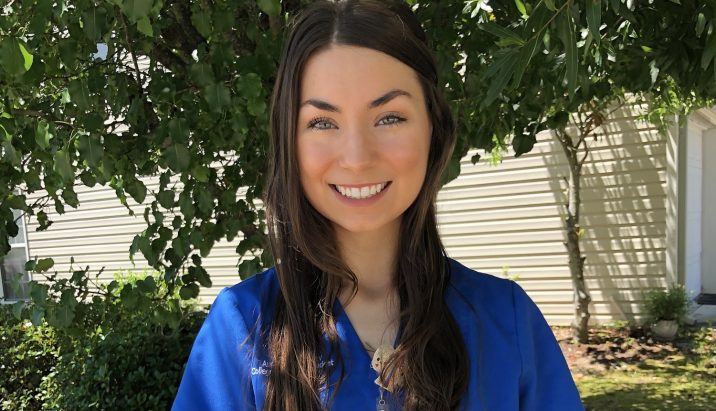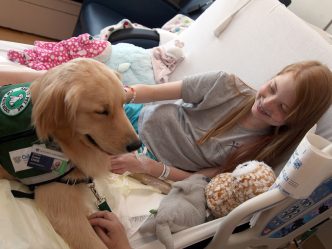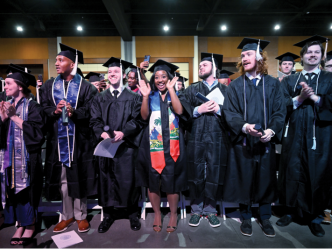February 22 was a typical evening at the Children’s Hospital of Georgia, as nursing student Jordan Buras was shadowing registered nurse Dawn Echevarria. This was Buras’ last night of several on a shift that took her into the wee hours.
The two of them were in a room in the Pediatric Intensive Care Unit checking on a five-month old baby, when things took a scary turn.
“Dawn was leaning over the bed,” said Buras. “All of a sudden, she started mumbling. I asked if she was doing okay. I walked over to her and saw her face, and I realized she was having a stroke. There was drool coming out of her mouth. That was the big tip-off.”
Buras’ training kicked in. She knew that she should try to get a stroke victim into a sitting position, so with no chairs in the room, she placed her on the floor.
“You kind of expect something to happen with your patients, but you never expect something bad to happen to your colleague,” she said.
Still shocked by what she was witnessing, Buras thought quickly. Should she scream for help? She didn’t want to wake the children nearby. Should she go next door asking for help, even though that would mean leaving Echevarria alone momentarily?
“I ran to the nurse next door [Sherrie Oliver] and said ‘It’s an emergency, Miss Dawn is on the floor,’” said Buras. “I saw the charge nurse — I grabbed her too.”
The nurses went into the room and started to assist Echevarria. Other people on the same floor came in as well, once all realized what was happening.
“I saw a nurse going to the far end room and she looked at me, and said, ‘I need you to come in here,’ so I presumed it was a patient that had issues,” said Dr. Smitha Mathew. “She was wheeling a wheelchair in there pretty quickly. Dawn was sitting on the ground, and it was very evident that she was having a stroke. We got as many people as we could in that room very quickly. We called a ‘code stroke’ but she wasn’t an inpatient, so we ended up calling the ER to let them know that she was coming downstairs.”
As all this was happening, Buras was called by a parent into another baby’s room to deal with a situation there. Buras started to feel overwhelmed by all that was happening, but took care of the baby, as her colleagues helped Echevarria.
“In the ICU, we are trained to help someone with a problem, without knowing all of the information,” said Henry Weigle, an emergency medicine resident working in the PICU that night who assisted with the situation as well.
Doctors in the emergency room were able to stabilize Echevarria, and now almost three months later, she is well on the road to recovery.
Thinking back on that night, Buras is glad that she was able to do what needed to be done in a timely manner.
“All I learned in nursing school came to me in that moment,” said the Jasper, Georgia, native. “It seemed like it happened so fast. People think they will go completely blank. Everything came back to me and I thought this was what I needed to do.”
Buras’ training and her calmness under pressure gave her greater confidence that she can handle anything that comes her way in her future nursing career. She was recently accepted into the Doctor of Nursing Practice program in Augusta University, and will start in the fall.
“That [incident] is the kind of thing that everyone in nursing school is afraid of,” she said. “I feel like if I experienced it firsthand, I feel confident that I could deal with it if it happened again.”
After the incident, Buras visited Echevarria in her hospital bed. Buras said the nurse was extremely grateful to her for saving her life. If Buras hadn’t been there, she might not have been found as quickly.
“People told me that she normally works on charting in a patient’s room, so if she had been gone for 30 minutes or an hour, they wouldn’t have thought much about it.”
Instead, thanks to Buras’ quick action and the team in PICU working together, Echevarria was in the emergency room within six minutes of having the stroke.
“You hope no one will have a stroke, but if you’re going to have one, the hospital is a good setting,” said Mathew. “In medical school, we learn that strokes are very time sensitive, especially in adults. Once you notice the symptoms of a stroke, you need to get medical attention quickly. If you fall outside of a certain window, you don’t have as much of a chance for intervention.”
In the United States, 795,000 people suffer a stroke each year, and of those, 140,000 do not survive it, so it is important to know the signs, as Buras learned in nursing school.
The acronym FAST can be used to look for the signs of a stroke: F for “facial drooping,” A for “arm weakness,” S for “speaking difficulty,” and T for the fact that time is of the essence.
Every gift, like every nurse, has the power to make a world of difference. Please visit here to make your gift in honor of your favorite nurse or nursing staff! With your gift, you will be supporting furthering nursing education for current AU nurses.
Augusta University Medical Center, located in the heart of the stroke belt, is the area’s only Joint Commission-certified Advanced Comprehensive Stroke Center. Patients in rural Georgia hospitals have fast access to quality stroke care at AU Medical Center and through REACH Health, Inc., a telemedicine program pioneered at Augusta University’s Medical College of Georgia that allows neurologists to diagnose and treat stroke patients remotely.
 Augusta University
Augusta University




